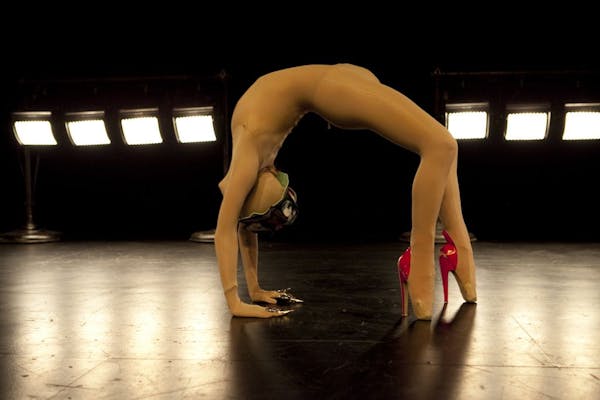Only serious theater people could have this much fun lampooning serious theater people.
With what appears to be sincere affection, the Rude Mechs aim "The Method Gun" squarely at the emotional and intellectual pillars of mid-20th-century theater convention. The 90-minute piece that kicked off Walker Art Center's Out There series on Thursday comments on itself, on the famed "Method" of Stella Adler and "A Streetcar Named Desire."
If you were to write a publicity blurb in the Rude Mechs spirit, it might read: "Five actors, committed to going deep -- way deep inside their bowels to find the actor's inner strength -- confront the humanity not only of themselves but of their audience and their world. And in that confrontation they find meaning, real meaning that they share through the bravery of acting and stagecraft."
Wow, that is deep.
The Rude Mechs, based in Austin, Texas, propose that they are devotees of Stella Burden, an acting guru who has developed "The Approach." We first pick them up in 1966 as they begin rehearsal for their deconstruction of Tennessee Williams' classic "Streetcar" -- a production that omits all lines spoken by Blanche DuBois, Stanley and Stella Kowalski or Mitch Mitchell.
At one point, Stella goes to South America, her acolytes are left to spread the gospel on their own and we get to see "Streetcar" without its principal characters. Scene 2, for example, consists of a hot dog vendor pushing his cart across the stage and shouting "Red Hot!"
Real emotional depth and interior development do matter in theater, yet the Rude Mechs' genius lies in their ability to find the cultish insanity of their craft.
The rehearsal, we are told, lasts nine years, because that's how long it takes for the actors to become sufficiently emotional.
"You liked me better when I was an acorn," one shouts angrily to another. "I'm an oak now!" Oh, indeed, how this man has grown -- not just as an actor but as a human being.
The actors go through kissing practice, crying practice, laughing practice. A tiger pops in here and there. Why? Tigers are good for a play because they are symbols of beauty and danger. There are vapid interviews, audition flashbacks and a balloon dance that would be ruined if I said any more.
And lest you think these are goofy kids just having a laugh, the Rude Mechs demonstrate in the evening's last 10 minutes a serious and physically adroit choreography of movement, narrative and magic.
These pieces take a while to jell and can seem tiresome at times. Could that be because theatrical conventions become tiresome sometimes? Hmmm. Stay with it, though, for the Rude Mechs work into the consciousness hours after performance. Their observations are both wicked and gentle, earnest and dripping in satire. As one actor, bereft after Stella's departure, notes: "She gave us ourselves and now we don't even have that." A tear, please?
Graydon Royce • 612-673-7299
In heated western Minn. GOP congressional primary, outsiders challenging incumbent

Minnesota Sports Hall of Fame: A class-by-class list of all members

This retired journalist changed professional wrestling from Mankato

